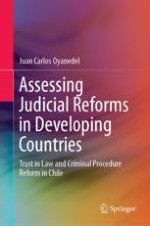2019 | OriginalPaper | Buchkapitel
2. An Overview of Judicial Reform in Latin America
verfasst von : Juan Carlos Oyanedel
Erschienen in: Assessing Judicial Reforms in Developing Countries
Aktivieren Sie unsere intelligente Suche, um passende Fachinhalte oder Patente zu finden.
Wählen Sie Textabschnitte aus um mit Künstlicher Intelligenz passenden Patente zu finden. powered by
Markieren Sie Textabschnitte, um KI-gestützt weitere passende Inhalte zu finden. powered by
